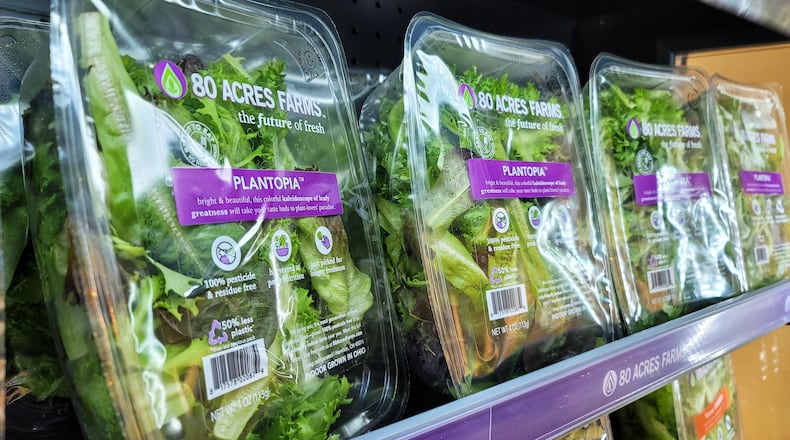The company’s high-tech growing processes will ensure that instead of being white and fibrous inside because they didn’t fully ripen on the vine, these will be red or pink, and will stay fresh longer than ones grown states away and shipped here.
The company also announced a collaboration with the University of Arkansas’ Agricultural Experiment Station to select unique blackberry varieties that are suited for growing in vertical farms.
“Berries are the No. 1 point for consumers and retailers,” because of their consistency, shelf life, and availability, said company spokeswoman Rebecca Haders. “Even blueberries: You buy one brand, they taste amazing. You go back to the same store, buy the same brand the next day and they’re awful.”
“And I think the expectations are pretty low, too, for how long they last,” Haders said. “Especially with a strawberry, you have to eat it quick, so they don’t rot, or they’re so fibrous and white inside.”
80 Acres grows salads, tomatoes, herbs and microgreens that can be bought at Kroger, Whole Foods, Jungle Jim’s Markets and elsewhere. It raises crops in optimal light without pesticides or herbicides, and recently was certified Kosher.
“We are calibrating and aligning all the growing conditions, incorporating several proprietary AgTech capabilities that were not available until recently, to bring hyper-fresh fruits and vegetables loaded with taste and nutrition so our consumers can indulge in healthy diets,” said Victor Verlage, 80 Acres’ senior vice president for operations, agronomy, and research and development at 80 Acres.
The company has been growing strawberries for years in Springdale, Ark., which is close to Fayetteville, where the university is. The company has converted that farm from a commercial farm to a research & development growing place.
The university is well-known for its breeding of blackberries and other berries.
Only strawberries will be sold next year, “because a blackberry is a longer-growing crop,” Verlage said. “Depending on what varietals you choose, it may take up to two years to produce a crop.”
“One of the challenges you already know in the market is when you buy blackberries from the supermarket, if you’re lucky and they’re good, there will be two sweet and one bitter,” Verlage said. “The purpose here is they are even more flavorful and tasty than a normal blackberry, but all of the berries have to be great.”
“We want to delight the consumer every bite,” Verlage said.
“We are very excited about this new research partnership with 80 Acres Farms,” said Jean-François Meullenet, director of the experiment station. “Protected farming is a strategic research direction for the Arkansas Agricultural Experiment Station, and 80 Acres Farm is a leader in this area.”
Credit: Nick Graham
Credit: Nick Graham
About the Author


